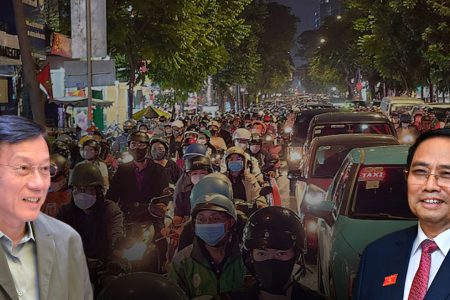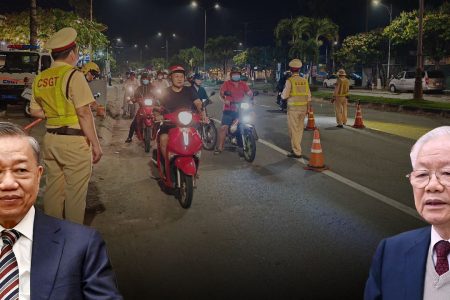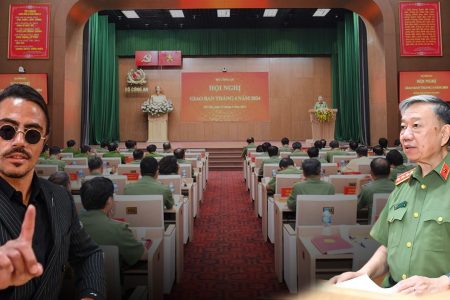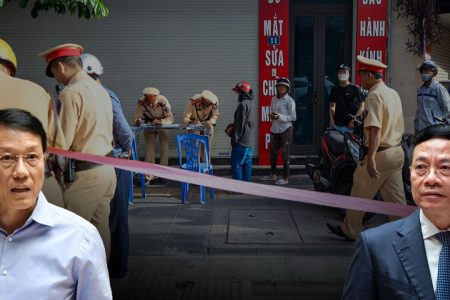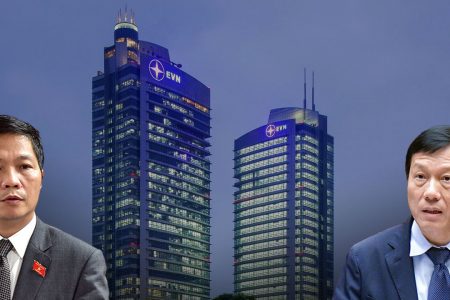
Stock falling, people die, others reduce expenditures
Early in the morning, my grandson called his mother. From afar, I can still hear his voice exclaiming: “Mr. T committed suicide. Our group also lost all the money given to him.”
Mr. T is his friend, both a former colleague of the same company and a close friend of the same group. They all work in marketing, have high skills, work for foreign companies, and the salary is not bad. However, among them, T is the richest under 30 years old, with a family with one child, a car, a house, and a lot of money
Until this morning.
T had been investing in stocks for several years now. In the past, it was very profitable, so T borrowed heavily from other people’s property books to borrow money from banks, and also borrowed cash from many people. T promises to pay interest up to 20%/year, three or four times higher than the bank. Being friends for a long time, knowing how to calculate, and seeing that T is definitely rich with houses and land, maybe a lot of people have lent their money to T.
But last night, T committed suicide. Before that, he returned the property book to one of my nephew’s friend groups. As for the amount of money collected from many sources and which sources, how much, only T knows and no one can get back. T’s floating assets are not small, sold for a few tens of billion to be sure, so perhaps his debts and liabilities are much larger to make him unable to pay but have to choose to commit suicide to get out of debt.
In Hanoi, although the press did not publish it, people still spread the word that the reason why a family of four committed suicide (a husband and wife and two children, a minor and a young child) was also due to losses in stock trade.
The cases mentioned directly in the press are not few. In June 2021, an article in the Economic Forum newspaper titled “Stocks fall, giants compete in … mental hospitals” mentioned three cases of “stock giants” who were taken to a hospital for treatment in the National Institute of Mental Health (Bach Mai Hospital) because of panic after losing all property and houses (due to bank mortgage for money). Not only that, like T, they also mobilized money and property from family, acquaintances, and the whole lineage. The similarity is that in the beginning, they both made a lot of profit very quickly.
But not everyone loses billions of dollars to being distraught. Also published: early last year, in Tra Vinh, a young man borrowed 300 million dongs, poured it all into the stock exchange, and lost everything. He jumped the Can Tho bridge but was saved in time.
Those are other people’s stories, though. “They died because of greed, but if we catch small fish regularly, we will never meet that case” – that’s what many people say to themselves. A scene that is easy to see in any cafe, eatery, restaurant… in Vietnam now is a group of people sitting at coffee, but the phone doesn’t leave their hands, the first sight is the red-blue screen of the stock exchange. Even just walking on the street, you can hear a group of pedestrians passing by you saying “I won this one” “The other one is coming to the shore” or “You can follow it safely.”
Plunging into markets that are easy to make money in is a wise choice not only for humans. Plants, animals, insects, and even viruses know how to choose a fertile environment to live in. That’s the normal rule. But in the political, legal, and social context of Vietnam, many things that are normal elsewhere have become unusual.
That’s when people and families quit their professional jobs to become “stock investors.”
The special politics, the irregularity, and injustice of the law, and the instability of society… make people have no confidence to build what is sustainable. Crony capitalism brings easy and terrible profits to corporations and factions and threatens the loss of those who do not choose sides in time. Then gambling is more than that.
Investing in securities under the direction of the driving teams (groups of people who lead, jointly push the stocks to artificially high to attract money from investors who lack knowledge and experience. If they get enough, they will release these stocks, sending the market down) is easy, especially when they hint that some big guys are “covering” to build trust.
Virtual currency too.
It seems that State officials, due to their availability and connections, as well as pressure from low wages that do not guarantee a living, are the people who participate in the stock market and virtual currency the most. Especially in the past three years of the epidemic, many people lost their jobs, reduced their salaries, and did not get a basic salary increase, the need to make money quickly became more urgent.
On June 4, 2022, Chairman of the National Assembly Vuong Dinh Hue said at a meeting of the parliament “Previously, there was an annual salary increase adjustment, but in the past 3 years, it has not been done due to the impact of the Covid-19 epidemic. Meanwhile, the life of cadres, civil servants, and public employees are very difficult. Next year, it is necessary to calculate the basic salary increase for officials and employees.”
The problem is that the increase is not worth much, not enough to compensate for the price slippage. And still waiting for the tools to calculate, maybe it’s the tangerine season.
In another very relevant development, the largest labor market in Vietnam is in need of 135,000-150,000 additional workers, but it continues to lack, especially in the last months of the year.
In addition to objective causes, three years of the epidemic have created permanent changes in the depth of workers’ lives. Of the more than 23,000 people who lost their lives in the epidemic, there are many people from other localities who come to Ho Chi Minh City to live and work. Losing a parent/wife/husband/child also means losing support and the right hand in the struggle for a living. Prices after the epidemic escalated unthinkably. Many people are forced to return home to rely on their families, save money on rent, and have grandparents to help look after their young children to go to work. The city has lost a lot of its appeal to out-of-province workers when the pandemic has exposed serious weaknesses, but they have accepted it for many years now.
The State has the policy to support VND500,000/month for a number of employees who meet all conditions such as renting a motel, working under a labor contract with a term of one month or more, and having social insurance. festival.
And self-employed means self-care.
But the rental price of a duck houses in Ho Chi Minh City is currently about VND1.5 million/month/person, so the working class and laborers can still only rent together in damp, cramped hostels that lack air and are not as hygienic as before the pandemic hit. They also have to tighten their spending, move to cheaper accommodation, find part-time jobs and only focus on the minimum cost of living.
Beneath the pictures of the red flags on the street and the people’s extreme excitement after the men’s football team’s victories at the 31st SEA Games is the worry of gray hair.
The whirlpool of paradoxes about labor, employment, and life make the dream of getting rich overnight all the more intense and popular.
It is essential that policies really remove difficulties for non-state enterprises and workers so that they can live, breathe, remove, earn money and pay taxes to the State.
But can the State of Vietnam be trusted, the center of creating these difficulties?
Thoibao.de (Translated)







